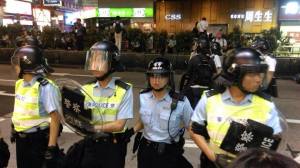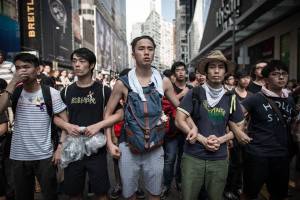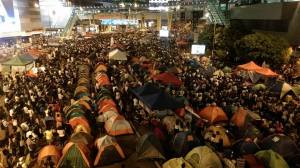As Americans, there are a lot of things in this world that, today, we cannot fully understand. One of those things happens to be the fight for democracy, which our forefathers endured almost 240 years ago.
Today, the people of Hong Kong, China are fighting for their right to democracy. Tensions are running high in the city, with many people skeptical and worried about what will happen next. Twenty years ago, its inhabitants were promised full democratic rights by China, but the central Chinese government in Beijing has put many tactics into place to take those rights away, in direct violation of their agreement.

credit: Facebook
The protests started on September 22, 2014 and have persisted; what started out as a peaceful student protest has quickly escalated into what many feel has become the fight for their lives with many posters broadcasting the slogan, “If not us, who? If not now, when?”
With protests and vigils being fairly common in Hong Kong, it was not an unusual sight that many students were leading peaceful marches to protest Beijing’s new plan for the 2017 Hong Kong elections, which looked like China was going back on a promise it made way back in 1997.
Hong Kong had been under British rule for more than 150 years, but the British finally decided to hand the city over to the Chinese government with certain conditions. The first condition was hat residents of Hong Kong will be able to keep the rights they had, under British rule, as they had considerably more freedom than the rest of China. The second condition was that they could keep their autonomy. This deal was known as “one country, two systems.” The biggest part of this deal, though, was that in 2017, citizens of Hong Kong would get to elect the chief executive, their leader, in a democratic election for the first time, instead of the leader being appointed by a committee in place now, that is heavily influenced by Beijing; thus, the many fear that the pro-Beijing committee will select a ruler that will draw Hong Kong closer to China.

credit: Facebook
In 2007, the Chinese government again promised that they would give the people of Hong Kong their right to a democratic election which the citizens call universal suffrage, but there have been many signs to show the citizens of Hong Kong that the Chinese government does not plan to follow through with its promise. The most glaring sign of their imminent rights being taken away was the “white paper” issued by the government in July which stated that the government of China had “comprehensive jurisdiction” over Hong Kong and that the high degree of autonomy of [Hong Kong] is not an inherent power, but one that comes solely from the authorization by the central leadership.” This angered many citizens who felt it was a warning from Beijing that they would take away some of their rights or completely revoke them, leading to many protests.
The Chinese government then broadcasted their plan for the 2017 election in Hong Kong, which caused even more anger and frustration. The government said that citizens would be allowed to vote for their chief executive, but he would first have to be approved by a committee just like the one that now appoints the chief executive. To many citizens of Hong Kong, this feels like China’s first step to slowly taking away their democratic rights.
On September 26th, a group called Occupy Central, which had planned for their own “civil disobedience” campaign to launch on Wednesday the 1st of October, a national holiday celebrating the founding of communist China, decided to join the protests after they saw how quickly the situation was worsening.

credit: Facebook
The protestors became more adamant because the police in Hong Kong tried to suppress the movement with such violent force that it outraged the citizens. The police were fighting on the streets with the protesters, and they even brought out very militaristic looking guns. Then, three days later, the police fired tear gas into the crowd. Beijing clearly expressed their sentiments about the protests when they issued a statement that supported the actions of the police, and the chief executive did as well.
Hong Kong is a very orderly place; seeing protests getting as violent as they have been is something to note in a city like Hong Kong. Many citizens of Hong Kong see themselves as above the authoritarianism of the mainland and its disorder, but they are extremely worried that they might lose their unique way of governing if they accept the government’s new plan because they may lose their rights along with it.